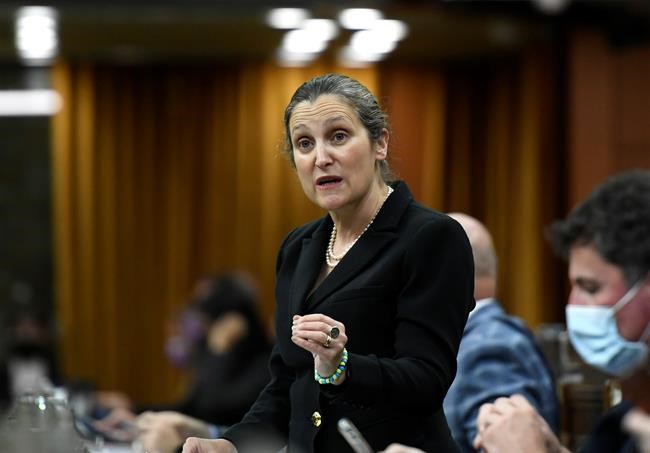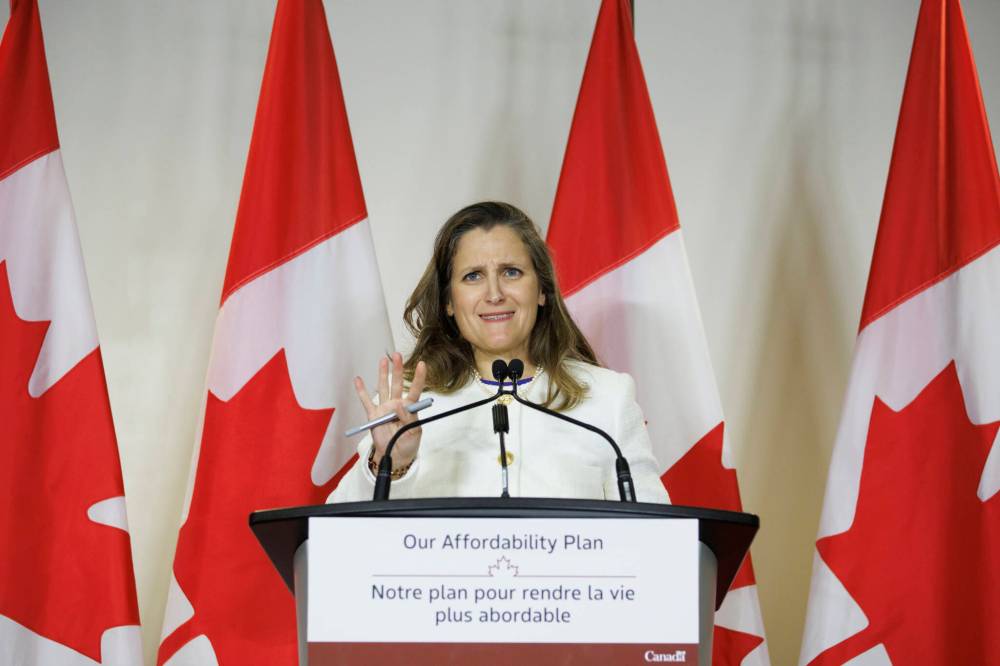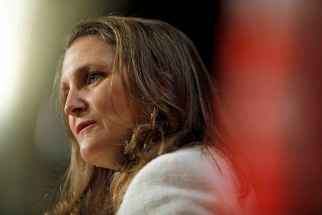Freeland’s restraint the right choice
Read this article for free:
or
Already have an account? Log in here »
To continue reading, please subscribe:
Monthly Digital Subscription
$0 for the first 4 weeks*
- Enjoy unlimited reading on winnipegfreepress.com
- Read the E-Edition, our digital replica newspaper
- Access News Break, our award-winning app
- Play interactive puzzles
*No charge for 4 weeks then price increases to the regular rate of $19.00 plus GST every four weeks. Offer available to new and qualified returning subscribers only. Cancel any time.
Monthly Digital Subscription
$4.75/week*
- Enjoy unlimited reading on winnipegfreepress.com
- Read the E-Edition, our digital replica newspaper
- Access News Break, our award-winning app
- Play interactive puzzles
*Billed as $19 plus GST every four weeks. Cancel any time.
To continue reading, please subscribe:
Add Free Press access to your Brandon Sun subscription for only an additional
$1 for the first 4 weeks*
*Your next subscription payment will increase by $1.00 and you will be charged $16.99 plus GST for four weeks. After four weeks, your payment will increase to $23.99 plus GST every four weeks.
Read unlimited articles for free today:
or
Already have an account? Log in here »
Hey there, time traveller!
This article was published 17/06/2022 (1270 days ago), so information in it may no longer be current.
There’s an old saying — commonly attributed (erroneously) to U.S. founding father Benjamin Franklin but more likely first intoned by 17th-century British parliamentarian/statesman Edwin Sandys — that advises “honesty is the best policy.” By laying out a straightforward assessment of how Canadians might endure the current inflation-driven fiscal stresses, Finance Minister Chrystia Freeland seems determined to demonstrate the general advice applies specifically to economic policy, as well.
Freeland leaves door open to more economic action

Posted:
TORONTO - The federal government is prepared to take further action to address more severe economic volatility, but Finance Minister Chrystia Freeland wouldn't say if a hard landing for Canada's housing market would be the trigger for such moves.
In a speech this week to Toronto’s Empire Club, Ms. Freeland opted not to announce any bold measures or big-money initiatives aimed at buttressing the nation against the current inflationary storm. Instead, she essentially told Canadians to hang onto their hats.
“I think it’s important for us to be candid with each other, with Canadians, that this is a volatile economic time and an uncertain economic time,” she said. “And for that reason, I can’t make any promises to Canadians about how the next weeks and months are going to unfold, and I want to be honest about that.”
Rather than using the occasion of her address to some of central Canada’s business and financial leaders to unveil sweeping programs aimed at stimulating the struggling economy, the finance minister instead outlined a package of already-announced initiatives, including enhanced benefits for workers, increased funding for rent-support and child-care programs and an Old Age Security top-up for seniors over 75, which total almost $9 billion and could help Canadians make ends meet during the current crunch.
Ms. Freeland’s stay-the-course speech came on the heels of the U.S. Federal Reserve raising its benchmark interest rates by three-quarters of a percentage point, an attempt to rein in inflation that amounts to the most aggressive rate hike since 1994. The Fed’s chair, Jay Powell, indicated that another significant rate increase will likely be announced in July.
The Bank of Canada, which has raised its key interest rate three times this year in response to inflationary pressures, is expected to follow the U.S. agency’s lead. And based on Ms. Freeland’s remarks this week, it will be mostly up to the Bank of Canada to help this country’s economy navigate the coming months of global financial unrest.

“It’s basically all on the central bank now,” said Business Council of Canada vice-president of policy Robert Asselin, who criticized the finance minister’s speech as long on rhetoric but short on policy. “(The Bank of Canada) will be the one doing the heavy lifting on inflation.”
When one considers how the Trudeau government has often been accused of politically expedient policy decision-making and superfluous speechifying (such as the prime minister’s rapid gun-control response to recent mass shootings in the U.S.), Ms. Freeland’s absent-of-announcements address stands as something of a breath of fresh air.
It’s also the most prudent plan in the current economic climate. With the Liberals’ budget this spring having already projected a $52.8-billion deficit for the 2022-23 fiscal year, it would have been unwise to suddenly start throwing billions more into a doomed-to-fail domestic attempt to cool an inflationary trend that is being fuelled largely by events on the other side of the world.
And while there are doubtless some Canadians who would argue another support-program cheque from the government is what’s required, Ms. Freeland’s straight-talk/no-new-action approach is what the current financial moment demanded.
Honesty. A good financial policy. Imagine that.









